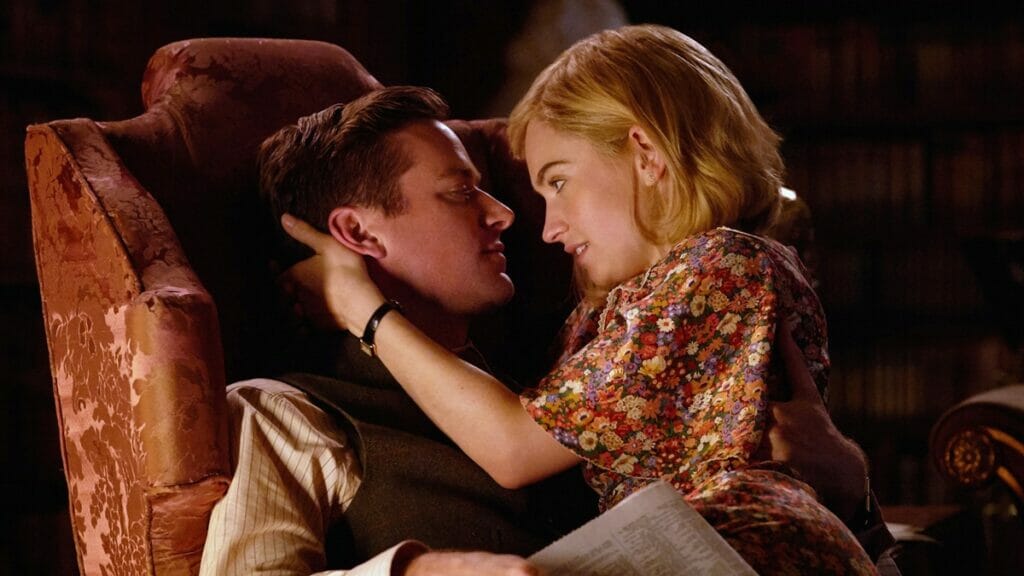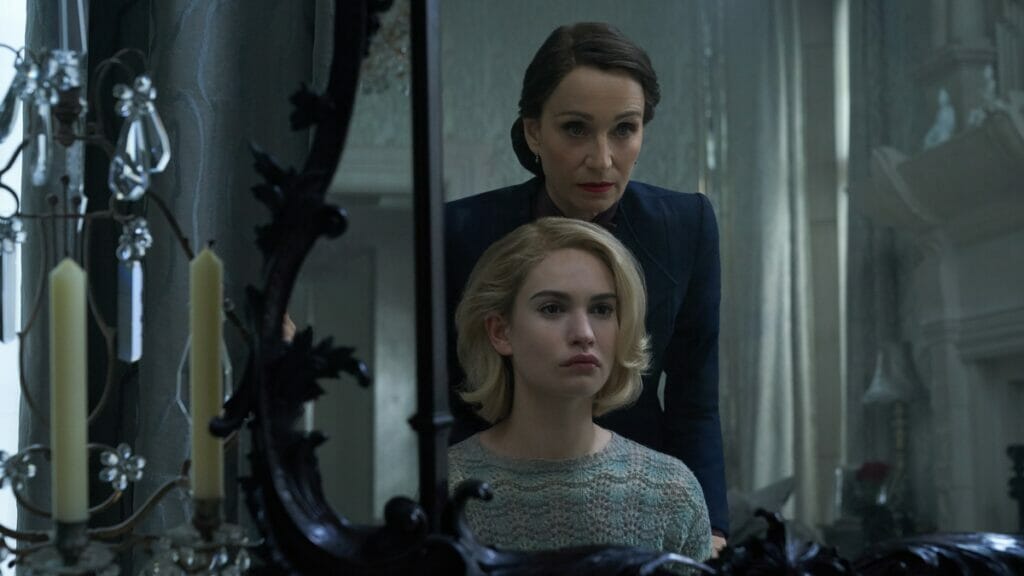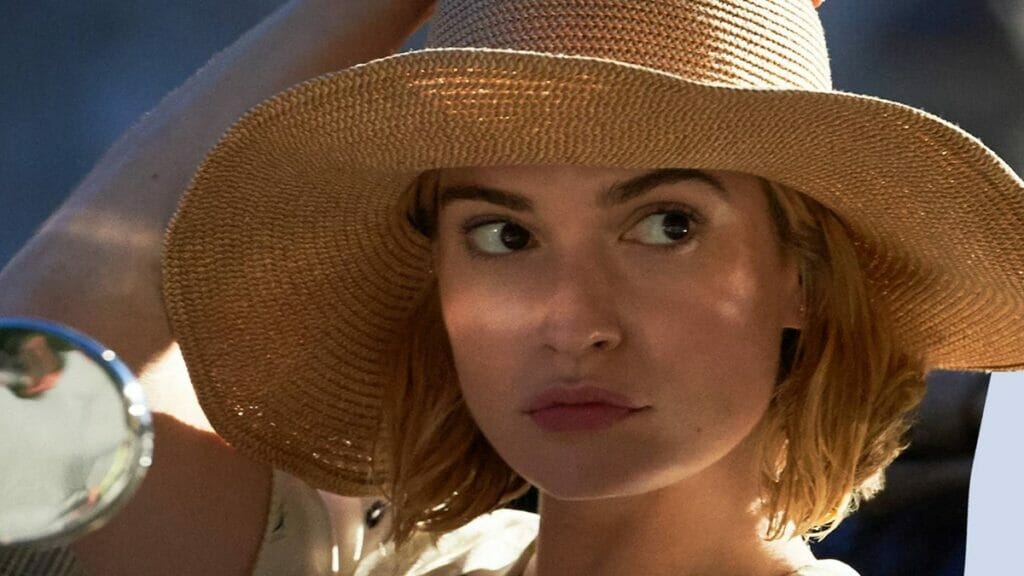Wheatley’s adaptation of the classic gothic novel frequently looks lush, but can’t back up its visuals

Every month, The Spool chooses to highlight a filmmaker whose works have made a distinct mark on the cinematic landscape.
With his love of mixing horror, dark comedy, and crime Ben Wheatley has been flirting with but never breaking through to the mainstream. However, this month that may all change.
This piece was written during the 2023 SAG-AFTRA strike. Without the labor of the actors currently on strike, the works being covered here wouldn’t exist.
“Last night I dreamed I went to Manderley again…” So begins Daphne du Maurier’s gothic masterwork Rebecca, one of the most famous opening lines in fiction. Rebecca proved a hit upon release in 1938 and has remained in print ever since. Alfred Hitchcock’s adaptation, coming just two years later, netted him his first Best Director nomination. That interpretation of the text has come to be considered a classic, and with good reason. Its misty black-and-white photography and mysteries hypnotize.
Over the years, its rich legacy has garnered a score of notable fans, including Christopher Nolan. Introducing a revival showing at the Egyptian Theater in 2019, the director described seeing the film on the big screen as a “transformative experience.” Given the historical weight of the novel and the Hitchcock adaptation, it is easy to imagine filmmaker Ben Wheatley, himself a skilled hand at suspense and relationship studies, being both excited and perhaps a bit intimidated by the chance to offer his own interpretation. Alas, Wheatley’s 2020 film, made for Netflix, disappointingly fails to make any exciting choices. As a result, the new adaptation waters down the beloved thriller into a tepid period romance. The tension that makes both the novel and the 1940 film infinitely worthy of revisiting is nowhere to be found in this underwhelming successor.

Wheatley’s Rebecca gets off to a bad start almost instantly by trimming down the opening monologue whose full form hauntingly sets the stage in the novel. Instead, it opts for a series of flashing images presented in montage. It evokes nothing so much as the experience of watching a trailer, a feeling at odds with the story’s gothic tone.
Then, the film immediately whisks the audience to Monte Carlo. There, the unnamed protagonist (Lily James) works as a companion to a wealthy older woman (Ann Dowd, sadly underused here) and meets vacationing widower Maxim de Winter (Armie Hammer). A few stilted conversations later, the two launch into an unconvincingly breakneck romance. Their makeout sessions lack chemistry, a fact that Wheatley’s camera cannot overcome. Soon, the protagonist elopes with de Winter, taking on her famous moniker of “the second Mrs. de Winter.” When the newlyweds return to Maxim’s grand English estate, Manderley, their honeymoon period comes to a screeching halt. It seems the memory of the late first Mrs. de Winter—the titular Rebecca—is not easy to exorcise from the grounds.
A cowardly script from Jane Goldsman, Joe Shrapnel, and Anna Waterhouse further undercuts the actors.
The casting is not the Wheatley Rebecca’s biggest problem, but it certainly doesn’t help. While Kristen Scott Thomas brings a melancholic menace to the iconic role of Mrs. Danvers, James and Hammer feel badly miscast in their roles. James is unconvincing as a shy woman with no self-esteem. Even stuck in a bad wig, she moves through space with confident elegance. Hammer fares even worse as the supposed romantic hero. Not only does he lack the chilly charisma of Laurence Olivier’s original Maxim, but he can barely maintain his wobbly British accent. Olivier’s Maxim seemed physically stricken by grief and guilt. In contrast, Hammer’s Maxim looks perpetually constipated.
A cowardly script from Jane Goldsman, Joe Shrapnel, and Anna Waterhouse further undercuts the actors. Maxim’s unsettling asides about his new wife’s youth and naivety have been axed, perhaps to prevent age gap discourse. Regardless, it renders one of his famous monologues—“It’s gone forever, that funny young lost look of yours.”—nonsensical. Likewise, the film’s decision to adhere more closely to the novel’s ambiguity regarding Maxim and suicidal ideation drains a later gunplay scene of significance.

Despite favoring uncertainty in that case, Wheatley’s Rebecca often leans too heavily into telling when it should be showing. Even the taciturn Mrs. Danvers states her hidden intentions aloud. Worse, sometimes Rebecca goes beyond telling into a kind of overexplaining where further details only serve to confuse. For instance, a critical moment of Danvers’ scheming—attempting to trick the protagonist into losing Maxim’s favor by dressing in a costume Rebecca once wore—is muddled by the addition of a random maid who may or may not be the housekeeper’s accomplice.
Other attempts to offer elaboration simply fall flat. The movie feints at adding more class commentary by shooting the servants’ living quarters. Ultimately, though, Rebecca has even less to say about social status and money than Downton Abbey. Indeed, Wheatley’s chief concern appears to be photographing Sarah Greenwood’s immaculate 1930s production design. And lovingly records every inch of this lush Manderley he does. Unfortunately, it comes at the expense of the story.
In comparison, Hitchcock’s Rebecca made striking use of the set to comment on the de Winterses, Danvers, and their power struggle. People are framed as tiny, slight figures swallowed up by Manderley’s intricate railings and doorways. In some shots, characters appear caged or ghostly and insubstantial compared to their surroundings.
The film’s passionless climax feels characteristic of Wheatley’s Rebecca as a whole.
Wheatley’s Rebecca’s use of striking visuals instead reads as deeply incurious about its characters and their motivations. While he deploys interesting close-ups isolating individual body parts such as lips and hands, they are few and far between. Similarly, despite scattering several literal bird cages around the estate and giving Mrs. Danvers a caged bird paper toy to play with, Wheatley almost entirely fails to embrace this striking motif. But for one fascinating wide shot that depicts the second Mrs. de Winter and Danvers crushed together in a narrow rectangular window surrounded by other rectangular windows, the director mostly sticks to standard conversational close-ups and reverse shots. At the estate, in particular, he rarely moves the camera in a way that creates interest.
There’s nothing remotely arresting or memorable about Laurie Rose’s cinematography. The cold, bright light illuminating most scenes makes even the excellent production design feel textureless and fake. CGI additions, including a noticeably fake-looking swarm of birds that appears throughout, feel out of place.

The film’s passionless climax feels characteristic of Wheatley’s Rebecca as a whole. As obviously computer-generated flames destroy Manderley, the second Mrs. de Winter has her final encounter with Mrs. Danvers. Scott Thomas does her best with another clunky, ham-fisted monologue, while James stands, stranded, watching it through her shambolic wig. When Danvers jumps to her death, the film chooses a path that veers from the novel and the Hitchcock film with unsatisfying results. The image of Danvers’ silhouette against the flames as she burns to death in the 1940 adaptation is unshakable, a perfectly fitting end for a character obsessed with the house and its mistress to the point of murderous rage. The novel’s refusal to confirm the housekeeper’s fate ends the story on a satisfying note of haunting threat. Wheatley’s neither betwixt nor between finale can only disappoint.
The 1940 adaptation is also a classic example of a work that reveals deeper layers through a queer lens, given the villainous housekeeper Mrs. Danvers’ infatuation with the title character. It’s quite remarkable that despite coming 80 years later, this version of Rebecca does nothing to explore or deepen the story’s sapphic subtext.
Director Ben Wheatley had the chance of a lifetime with Rebecca. His adaptation is a gothic tale minus the gothic elements. While the set design for Manderley is impeccable, one could practically watch this movie with the sound off and lose nothing. Film may be a visual medium, but this take on Rebecca has nothing more. It’s not haunting. It’s empty.